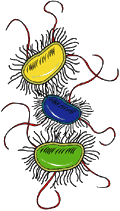 Français
Français Bacterial Infection Dictionary
What you have and what caused it

The discovery of many disease-causing organisms dates back to the 1800s. You may have heard of many infectious diseases from this era but have not experienced them first-hand. This is especially true if you were born within the last 30 to 50 years. Today, the frequency and incidence of many diseases have markedly decreased because of improvements in standard of living, sanitation and access to health care.
Groups of bacteria (Genus) can be made up of thousands of different strains (species). Some of the most common disease-causing organisms are:
Streptococcus - responsible for a wide variety of conditions with very different symptoms
- Bacterial Pneumonia - Streptococcus pneumoniae
- Tooth Decay - Streptococcus mutans, sobvrinus, sanguis, mitis
- "Strep" Throat - Streptococcus pyogenes (or "Group A strep")
- Tooth Decay - Streptococcus mutans, sobvrinus, sanguis, mitis
Escherichia - found naturally in the gastrointestinal tract where it suppresses the growth of harmful bacteria and synthesizes vitamins. Only some of these can cause disease.
- Gasteroenteritis - Escherichia coli (E. coli)
Clostridium - the toxins produced by this strain make it one of the most dangerous disease-causing organisms
- Tetanus - Clostridium tetani
- Botulism - Clostridium botulinum
- There are three types of botulism:
- Foodborne botulism -eating foods that contain the botulism toxin
- Wound botulism - wound infected with Clostridium botulinum
- Infant botulism - consuming spores of the botulinum bacteria (grow in the intestines and release toxin)
- Botulism - Clostridium botulinum
Salmonella - there are over 2,000 different species of Salmonella responsible for a variety of ailments
- Typhoid Fever - Salmonella typhi
- Food Poisoning - Salmonella enteritidis, typhimurium
Staphylococcus - found naturally on the skin. It may also cause infections in patients whose immune system has been compromised.
- Food Poisoning - Staphylococcus aureus
- Toxic Shock Syndrome - Staphylococcus aureus
Mycobacterium - responsible for many debilitating diseases
- Leprosy - Mycobacterium leprae
- Tuberculosis - Mycobacterium tuberculosis
Bacillus - harmless species inhabit the mucus lining of our stomachs and intestines. However, some Bacillus may cause infectious diseases.
- Anthrax - Bacillus anthracis
- Food Poisoning - Bacillus cereus
Shigella - a family of bacteria that cause diarrhea in humans ("shigellosis")
- Bacterial Dysentry - Shigella dysenteriae
Bacteria in Action | Bacterial vs. Viral Infections | Good and Not-So-Good Bacteria | The Evolution of Bacterial Resistance | Bacterial Infection Dictionary